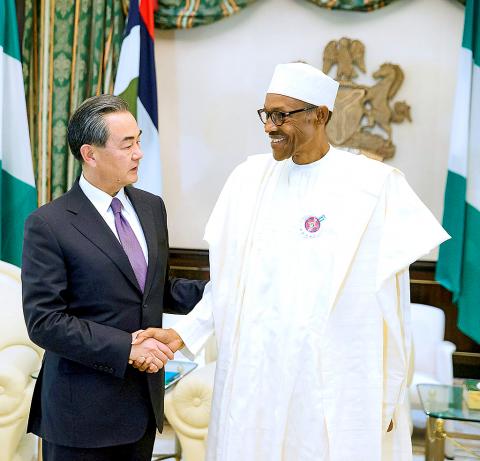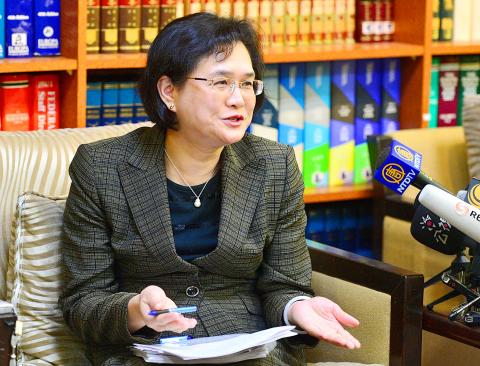The Ministry of Foreign Affairs yesterday said Nigeria has decided to play along with a Chinese “peremptory political scheme,” after the west African country announced that it would no longer recognize Taiwan as a nation and would cease all diplomatic relations in accordance with the “one China” principle.
The ministry in a news release accused Nigeria of seeking to confuse the international community by declaring that it would honor the “one China” principle and sever diplomatic relations with Taipei, as the two nations have never established formal diplomatic ties.
“The ministry strongly protests and deplores the Nigerian government’s cooperation with China to carry out a politically motivated, unreasonable, peremptory and brutal scheme,” it said.

Photo: Reuters
The strongly worded statement followed a joint news conference by Nigerian Minister of Foreign Affairs Geoffrey Onyeama and visiting Chinese Minister of Foreign Affairs Wang Yi (王毅) in Abuja on Wednesday, at which they said that Taipei’s office in the capital would be shut down and moved to Lagos, Nigeria.
“Taiwan will not have any diplomatic representation in Nigeria and also they will be moving to Lagos, to the extent that they function as a trade mission with a skeletal staff,” the state-run News Agency of Nigeria quoted Onyeama as saying.
Nigerian officials and organizations have also been banned from having official exchanges with Taiwan.

Photo: Wang Yi-sung, Taipei Times
At a news conference in Taipei yesterday morning, ministry spokeswoman Eleanor Wang (王珮玲) urged Nigeria to leave room for follow-up negotiations.
“In an effort to promote a substantial trade relationship, Taiwan and Nigeria inked a memorandum of understanding on mutually establishing trade missions on Nov. 21, 1990,” she said.
In 1991, Taiwan established a trade mission in the then-Nigerian capital, Lagos, before moving it to its new capital, Abuja, after reaching a consensus with the Nigerian Ministry of Foreign Affairs in August 2001, Eleanor Wang said, adding that since then China has been pressuring Nigeria to relocate Taipei’s office back to Lagos.
Beijing has stepped up efforts to suppress Taipei in the international arena as part of punitive measures over President Tsai Ing-wen’s (蔡英文) refusal to acknowledge the so-called “1992 consensus.”
The “1992 consensus” refers to a tacit understanding between the Chinese Nationalist Party (KMT) and the Chinese Communist Party that both sides of the Taiwan Strait acknowledge that there is “one China,” with each side having its own interpretation of what “China” means. Former Mainland Affairs Council chairman Su Chi (蘇起) in 2006 admitted to making up the term in 2000.
Later yesterday, Democratic Progressive Party Legislator Tsai Shih-ying (蔡適應) said that China’s nonsensical tactics were not conducive to improving cross-strait ties and were beneath the great power Beijing claims to be.
The lawmaker went on to ridicule Nigeria’s announcement, saying: “I did not know you could break up with someone without even being in a relationship with them in the first place.”
An internal Nigerian government document detailing the decision had been available since last week, Tsai Shih-ying said, calling on the Ministry of Foreign Affairs to step up its efforts to safeguard Taiwan’s international status.
Separately yesterday, in Guatemala, Presidential Office spokesman Alex Huang (黃重諺), who is accompanying the president on her ongoing visit to Central America, said China’s pressuring of Taiwan would only raise hackles.
Beijing’s return to its old track — the use of pressure or intimidation — would only antagonize Taiwanese and would not be favorable to the development of cross-strait relations, he added.
“The existence of the Republic of China is an indisputable fact. Applying pressure and intimidation will not change that fact,” Huang said.
Additional reporting by CNA

The combined effect of the monsoon, the outer rim of Typhoon Fengshen and a low-pressure system is expected to bring significant rainfall this week to various parts of the nation, the Central Weather Administration (CWA) said. The heaviest rain is expected to occur today and tomorrow, with torrential rain expected in Keelung’s north coast, Yilan and the mountainous regions of Taipei and New Taipei City, the CWA said. Rivers could rise rapidly, and residents should stay away from riverbanks and avoid going to the mountains or engaging in water activities, it said. Scattered showers are expected today in central and

COOPERATION: Taiwan is aligning closely with US strategic objectives on various matters, including China’s rare earths restrictions, the Ministry of Foreign Affairs said Taiwan could deal with China’s tightened export controls on rare earth metals by turning to “urban mining,” a researcher said yesterday. Rare earth metals, which are used in semiconductors and other electronic components, could be recovered from industrial or electronic waste to reduce reliance on imports, National Cheng Kung University Department of Resources Engineering professor Lee Cheng-han (李政翰) said. Despite their name, rare earth elements are not actually rare — their abundance in the Earth’s crust is relatively high, but they are dispersed, making extraction and refining energy-intensive and environmentally damaging, he said, adding that many countries have opted to

African swine fever was confirmed at a pig farm in Taichung, the Ministry of Agriculture said today, prompting a five-day nationwide ban on transporting and slaughtering pigs, and marking the loss of Taiwan’s status as the only Asian nation free of all three major swine diseases. The ministry held a news conference today confirming that the virus was detected at a farm in Wuci District (梧棲) yesterday evening. Authorities preemptively culled 195 pigs at the farm at about 3am and disinfected the entire site to prevent the disease from spreading, the ministry said. Authorities also set up a 3km-radius control zone

CONCESSION: A Shin Kong official said that the firm was ‘willing to contribute’ to the nation, as the move would enable Nvidia Crop to build its headquarters in Taiwan Shin Kong Life Insurance Co (新光人壽) yesterday said it would relinquish land-use rights, or known as surface rights, for two plots in Taipei’s Beitou District (北投), paving the way for Nvidia Corp to expand its office footprint in Taiwan. The insurer said it made the decision “in the interest of the nation’s greater good” and would not seek compensation from taxpayers for potential future losses, calling the move a gesture to resolve a months-long impasse among the insurer, the Taipei City Government and the US chip giant. “The decision was made on the condition that the Taipei City Government reimburses the related